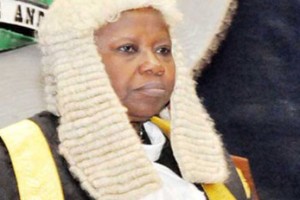
After 28 months in the saddle as Nigeria’s number one judicial officer, Justice Mariam Aloma Mukhtar will on November 20, bow out as the 14th Chief Justice of Nigeria after attaining the mandatory retirement age of 70 for Supreme Court justices. The first female CJN’s tenure in the history of the nation is regarded by many as eventful. Her exit, no doubt will be missed by many.
Aloma Mukhtar is the first and only female Chief Justice of Nigeria who became the first female to be sworn into the Court of Appeal on September 24, 1987 and the first female justice of the Supreme Court in June 2005 after Senate confirmation.
The road to Mukhtar’s emergence began in April 2012 when her predecessor in office, Justice Dahiru Musdapher served the National Judicial Council (NJC) the mandatory three-month notice of retirement.
In appointing Mukhtar who was the most senior in the apex court, President Goodluck Jonathan complied with Section 231 (1) of the Constitution of the Federal Republic of Nigeria, 1999 as amended upon the recommendation of the National Judicial Council, subject to confirmation of such appointment by the Senate.
Paragraph E, Third Schedule Part 1 of the 1999 Constitution, as amended requires the Federal Judicial Service Commission to advise the National Judicial Council in nominating persons for appointment to the office of the Chief Justice of Nigeria. Upon receiving Judicial Commission’s advice, the NJC made the recommendation to Mr. President. This is unlike the American system where the President goes out of his way to search for a nominee and selects from a list of qualified candidates.
When Justice Mukhtar stepped in as Chief Justice of Nigeria on July 16, 2012, there was great expectation by people who are keen observers of her antecedents. Her accession therefore to the exalted position of Chief Justice of the most populous country of black Africa was a welcome development to many Nigerians who expected her to come and clean up the Augean stable that the judicial institution had become.
As the first female to attain the position in Nigeria, she carries the burden of proving her mettle as well as surpassing the performance of her all male predecessors in office.
In her first speech at the Senate screening on July 11, 2012, she had said, “On the perception of the judiciary by the public, indeed as it is as at now, it is very bad and I am saddened by it. But, then, I said earlier on, I will try, I don’t want to sound like a broken record. I will try to make sure that the confidence reposed in the judiciary, as it were before, will be returned. I will try as much as possible to ensure that the bad eggs that are there are flushed out; that there will be a cleansing by the National Judicial Council based on petition. It is sad that the ordinary man on the street thinks and feels that he cannot get justice. This is because of the situation we find ourselves. I will ensure that this perception changes.”
After 26 months in the saddle, Mukhtar had been adjudged to have performed creditably well.
Carol Ajie, Human Rights Lawyer and Fellow, Leadership and Advocacy for Women in Africa had this to say about justice Mukhtar,
“Justice Mariam Mukhtar, had worked twice as hard as others as a judge through the hierarchy of courts before she was elevated to the Supreme Court Bench in June 2005, a measure that wholly prepares her for the challenging task ahead. Of impeccable integrity, she earned momentous respect from members of the Bench and Bar in a way that is unprecedented. Accomplished, she comes with iconic experience and legendary judicial finesse. Adored by many who look upon her as our super model and mentor; firm yet fair with a reputation for intellectual precision and zero tolerance for corruption, fit as the 13th CJN and first female to ascend this zenith, at a time the judiciary seeks the cleansing of the Augean stable, to win public respect.”
Femi Falana, Senior Advocate of Nigeria and one of Nigeria’s foremost human rights activists has this to say about Justice Mukhtar, “In a country where judicial corruption has been virtually institutionalized, I make bold to say that Justice Mukhtar has never been associated with corrupt practices or any form of abuse of office. She is conservative but ready to take a radical stand in defence of the rule of law. She is quiet but aggressive in dealing with cases of corruption. Her decision to team up with Adesola Oguntade JSC (as he then was) and Walter Onnoghen JSC in writing powerful dissenting opinions in the controversial case of Mohammadu Buhari v Independent National Electoral Commission (INEC) convinced the reactionary forces in the legal establishment that she could rock the boat if allowed to become the head of the country’s judiciary. The clean bill of health given to Justice Ayo Salami, the suspended President of the Court of Appeal by a Committee of the National Judicial Council (NJC) chaired by Justice Mukhtar was the last straw that broke the camel’s back. A plot was therefore hatched to prevent her from becoming the CJN’’.
Mrs. Funke Adekoya (SAN) of Aelex Law firm and candidate in the 2014 NBA election, likened Justice Mukhtar’s job to that of Hercules’ cleaning of the Augean saying “When the Chief Justice of Nigeria, Justice Aloma Mukhtar was sworn into the office in July 2012, there were many calls upon her to restore the judiciary to its pride of place in the body polity by investigating the rumours of corruption that were rife, and acting on the many complaints about judicial behaviour. As she has only two years in office as Chief Justice of Nigeria, this is her augean stable’’.
Looking back however, it can be said that Mukhtar did not disappoint Nigerians. She indeed worked hard and her effort to sanitize and remove the bad eggs in the nation’s judiciary is not unnoticed. Speaking on her experience in office, she says,
“On my assumption of office as the Chief Justice of Nigeria and Chairman of the National Judicial Council, I inherited 139 petitions, 106 of which were vexatious or baseless, only 33 of the petitions were considered worthy of attention. After my assumption of office as the Chief Justice, 198 fresh petitions were filed, of this number, 150 were found to be frivolous, 15 are awaiting responses from judges and only 21 were slated for consideration.
We must always remain conscious of the fact that anybody who raises an allegation of corruption against a judicial officer must be ready to substantiate it. Anybody who also offers baseless allegation must in line with the relevant statutes must be to face the long arms of the law.”
A firm believer in judges’ discipline, Mukhtar never shy away from explaining to them the path she expects judges to tow. Hear her,
“There is indeed no reason why a judicial officer who sits over trials should not be made to come under trial in deserving cases, as a person who cannot follow must not lead and a person who cannot practice incorruptibility must not sit at judgment over others and find it humiliating to stand trial. “What is more worrisome is that members of the Bar who are learned in the country’s legal system have indulged themselves in many negative practices. This has led to an influx of frivolous petitions before the National Judicial Council.”
Accessing his principal, Ahuraka Yusuf Isah, media aide to CJN wrote that so far, not less than 100 editorial comments were published in the dailies and magazines in reactions to Mukhtar’s onslaught on the judiciary in Nigeria.
In a recent article in which Justice Mukhtar’s efforts against judicial rot was highlighted, Ahuraka said, “Prior to Justice Mariam Aloma Mukhtar’s assumption of office as the Chief Justice of Nigeria (CJN), many had lost hope in the Judiciary’s ability to dispense justice independently. The state of affairs in the Judiciary was aptly captured in a report by the US Department of State on Human Rights practices for 2011. The report had observed copiously that the Nigerian Judiciary was very corrupt and susceptible to manipulations by the rich elite in business and politics.
While many were still in doubt about her capacity to tackle the rot in the system, some who knew Justice Mukhtar as an incorruptible judicial officer and an individual with rare sterling qualities thought otherwise.
According to Ahuraka, Newsweek, a British magazine named Justice Mukhtar as one of the ‘125 women of impact in the world’ in its April 8-15, 2013 edition. Her nomination was premised on her judicial cleansing reform and avowed determination to get rid of judges involved in fraudulent practices.
Specifically, the magazine noted that, ‘’in a country notorious for its crooked officials, Nigeria’s first female Chief Justice, Mukhtar, has built a reputation as an unwavering reformer unafraid to root out criminals.” Also, the World Justice Project (WJP), an independent, multidisciplinary organization working to advance the rule of law globally, scored Nigeria high only in civil justice among the nine factors it studied in its report recently released. The Washington-based WJP accessed the 99 countries studied on compliance with the rule law. The WJP Rule of Law Index 2014 report awarded Nigeria a pass mark only in Civil Justice, ostensibly the Judiciary headed by Justice Mukhtar.
In its editorial of July 15 this year, The Guardian newspaper commented thus; ‘’Speaking at the opening session of a conference on judicial reforms organized by the Nigerian Bar Association (NBA), in conjunction with the United Nations Office on Drugs and Crime (UNODC) and some Non-Governmental Organisations, the Chief Justice accused SANs working in tandem with corrupt judges being investigated by the National Judicial Council (NJC) of being guilty of corruption and misconduct. “She cited a particular instance where a judge accused of corruption invited about six SANs to represent him before the NJC. The conference on judicial reforms, in which the Chief Justice spoke, could not have come at a better time in view of dwindling public confidence in the judiciary. It is indeed noteworthy and commendable that Chief Justice Mukhtar has waged a relentless war on corruption in the judiciary since she assumed office,” Ahuraka said.
Born on November 20, 1944, Mukthar was called to the Nigerian Bar on June 26, 1967. By September 24, 1987, she became the first female to be sworn into the Court of Appeal. She breaks another record as the first female justice of the Supreme Court of Nigeria when the Senate confirmed her appointment on May 10, 2005.
She started education at St. George’s Primary School, Zaria, and later at St. Bartholomew’s School, Wusasa, Zaria. She proceeded to Rossholme School for Girls, East Brent, Somersets, England, Reading Technical College, Reading, Berkshire England, Gibson and Weldon College of Law and was called to the English Bar in November, 1966.
She worked as a pupil state counsel, Ministry of Justice, Northern Nigeria in 1967; Office of the Legal Draftsman, Interim Common Services Agency, Magistrate Grade I, North Eastern State Government in 1971; Chief Registrar, Kano State Government Judiciary, 1973; Judge of the High Court of Kano State, 1977-1987; Justice of the Court of Appeal, 1987-1993; presiding justice of the Court of Appeal, 1993-2005; and justice of the Supreme Court from June 2005 to date.
With just two months to the end of her tenure as CJN, many can testify that, though we have not gotten to the promised land, remarkable progress has been made towards that direction since Justice Mukhtar assumed office two year, two months ago. [myad]






